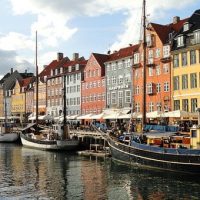France, located in western Europe, is considered to be a wealthy, high-income nation.
The country is characterized by medieval cities, Mediterranean beaches, and alpine villages.
France is known for its exceptional wine and sophisticated cuisine, among other things.
In addition, the French are spoiled with varied landscapes, including mountains in the Alps, sweet-scented lavender fields in Provence, and magical beaches in Nice, Marseille, and Corsica.
Paris, the capital of France, is world-renowned for its fashion houses, art galleries such as the Louvre, classical art museums, and monuments like the Eiffel Tower.
But, have you ever considered making the move to this beautiful country?
You may want to consider some of the advantages and disadvantages of living in France before you do.

Contents
Pros of Living in France
1. The food
It is no secret that France is world-renowned for its cuisine.
Most French chefs are in high demand at fine dining establishments around the globe and with good reason.
In fact, it may even be safe to state that the French perfected the art of cuisine.
It is not just their cuisine that makes this country so special, but the everyday food that you can enjoy here as part of the culture.
Do you like croissants?
Then you will be happy to know that the croissant is basically a staple on the table in this country.
Their cruise consists of traditional food and a very specific style of cooking that is unique to this country.
And it’s easy to understand why this cuisine is so popular.
It encourages fresh ingredients, and simple flavors, and demonstrates pride in presentation.
Plating is everything in this style of cuisine.
Furthermore, French cuisine has been the world leader for over two centuries in gastronomy.
2. Public transportation
In France, rail, air, road, and water transportation is very advanced and are well developed.
Getting from one side of France to the other is relatively inexpensive.
In fact, the public transportation in this country is just downright amazing!
France has very good road and rail links with neighboring countries.
The transport system offers discounts to students so that they are able to travel and tour the country.
In the cities in France, it is cheaper and more effective to make use of public transport than it is to use a car.
In fact, you could probably get by without having to own a vehicle and the expensive insurance that goes along with it.
Another bonus for those who are environmentally conscious is that most of the public transportation in this country uses less energy, which means that it is more friendly to the environment.
3. Healthcare
The healthcare system in France is world-class and considered to be a high-quality healthcare system.
It offers full coverage and may be one of the most important considerations when making the move to France.
The universal cover is offered to all citizens of France, irrespective of age or economic class.
The healthcare system in France is made up of integrated public and private services which include doctors, specialists, and hospitals.
The quality of healthcare in this country is evident through health measures such as infant mortality and life expectancy.
The country consistently ranks highly, globally, in both of these areas, which is a testament to the high quality of its healthcare system.
Another key point to mention is that the World Health Organization has named France the number one country in the world when it comes to healthcare.
4. Affordable education
Public education institutions in France are not only extremely affordable, but they are also one of the best systems in the world.
On average, the tuition and fees will differ depending on what you study and which institution you decide to study at.
But, on average, you will pay around 170 EUR per year to study a bachelor’s program.
There are programs that are more expensive, such as engineering degrees which may cost around 620 EUR per year.
The reason for the low tuition fees at public institutions is that the government subsidizes higher education at these establishments.
That means that the real cost of education in France is similar to other countries around the world, but because of the subsidized education system, tuition and fees are extremely affordable.
The system has been modified for EU students who now pay tuition according to family income.
5. Travel opportunities
Due to its location, France is an excellent country for those who love to travel.
The country is shaped like a hexagon and is bordered by Germany, Italy, and Switzerland in the east, while Belgium and Luxembourg border the northeast of the country, and Spain, the Mediterranean Sea, and Andorra border France in the south.
And, because of the excellent rail and road connections to these countries, traveling around Europe is a breeze.
6. Excellent wine
Without a doubt, France is a world leader in wine production.
France is considered the “old world” in the wine-making business and has ruled the industry with varietals like Burgandy, Merlot, and Syrah, to mention a few.
If you are a wine connoisseur, then you will love living in this country.
And, as a side note, only Champaign produced in Champaign, France, may bear the name of the real champaign.
7. Rich history and culture
France is famous for its contributions to world art, fashion, history, literature, and culture.
This is a major benefit of living in this country, as you will be exposed to a rich history and a culture that has transcended millennia.
Cons of Living in France
1. Childcare is expensive
There are several options for childcare in this country.
The cost of childcare can be quite expensive and easily eat into your budget.
The most common type of childcare in France is a nursery.
There are other options, such as family-run nurseries, associative care, and private care.
However, a private, state-licensed caregiver can be quite costly.
These nurseries offer full-time and part-time care.
An important side note is that these facilities usually have very long waiting lists.
It is recommended to sign up shortly after falling pregnant to ensure that your child will be looked after when you are at work.
2. Housing is old
France has some very old homes and apartments.
Some of them are as old as 1,000 years in the north of France.
The problem here is that these homes may lack proper insulation.
In addition, there may only be one bathroom in a home or apartment.
While this should not be too much of a problem for a small family of three, it may pose a bigger problem for larger families with more than two children.
Many of the older homes also lack simple things like light fixtures and appliances that the newer homes come standard with.
The rooms in these old structures also tend to be rather small.
The problem is that newly built homes with modern fixtures and appliances are much more costly.
3. Dirty streets in Paris
You may have come to know France, and especially Paris, by the beautiful photographs that show happy tourists, clean streets, and families having fun.
But this is not an accurate depiction of the real Paris.
The city has had a major cabbage problem with dirt and rubbish strewn across the streets.
Many reporters have covered this problem over the years.
Luckily, this is starting to change, as Paris is apparently cleaning up its act.
Whether this will remain the trend is yet to be seen.
4. Cost of living
The cost of living in France does depend on where you choose to live.
In Paris, for example, you will need to earn around €850 to €1000 a month, to live a relatively comfortable life, but that is excluding rent or housing fees.
And that is the fee for living in the city center.
Keep in mind, that Paris often makes it to the top of lists that highlight the most expensive cities to live in in the world.
If you opt to live in the more rural parts of France, in the south, for example, the cost of living drops considerably.
Keep in mind that other aspects covered under the term “cost of living” may be considerably cheaper, especially in comparison to the rest of Europe.
For example, schooling and utilities such as the internet are very cheap, and so is the public transportation system.
But, housing and childcare really drive up the cost of living in this country.
5. High taxes
The taxes in France are very high.
The top tax rate in France is 50.2%.
France has one of the highest tax rates among the OECD countries.
In fact, taxes in France account for 45% of GDP.
Keep in mind that the government subsidizes schooling and the transportation system in France is extremely inexpensive.
Furthermore, healthcare in France is covered by the government with a small portion of it being paid for by citizens.
These factors are paid for with tax money.
Therefore, the income tax in France is very high.
6. Language barrier
You may already know this, but if you move to France, get cracking on your language skills.
The French believe that if you live in their country you should at the very least be able to speak their language.
They are rather intolerant of people who do not make an effort to speak the language.
You should make it a priority to learn French and be somewhat fluent in the language if you hope to survive in this country and be accepted into French society.

Pros and Cons of Living in France – Summary Table
| Pros of Living in France | Cons of Living in France |
|---|---|
| 1. The food | 1. Childcare is expensive |
| 2. Public transportation | 2. Housing is old |
| 3. Healthcare | 3. Dirty streets in Paris |
| 4. Affordable education | 4. Cost of living |
| 5. Travel opportunities | 5. High taxes |
| 6. Excellent wine | 6. Language barrier |
| 7. Rich history and culture |
France Safety Overview
READ THE FULL REPORT: France Safety Review
Safety Index:
- OVERALL RISK: MEDIUM
- TRANSPORT & TAXIS RISK: MEDIUM
- PICKPOCKETS RISK: HIGH
- NATURAL DISASTERS RISK: LOW
- MUGGING RISK: MEDIUM
- TERRORISM RISK: HIGH
- SCAMS RISK: HIGH
- WOMEN TRAVELERS RISK: LOW
Frequently Asked Questions
What kind of country is France?
France is a semi-presidential republic.
The president is the elected head of state and appoints the prime minister.
The territory of France consists of 18 administrative regions and five overseas regions.
What was the currency in France before the Euro?
The French franc.
What do the French call greetings that consist of kissing people on the cheek?
In France, when you greet someone by kissing them on the cheek, it is called “Faire la bise”.
What traditional cake is eaten on the 6th of January?
This cake is called the Galette Des Rois.
This French tradition is eaten all month long in January.
Which French singer was married to Johnny Depp?
Johnny Depp and Vanessa Paradis were partners from 1998 to 2012 and have two children.












As a French person, I disagree with the intolerant part. Although it is true that our level of English is terrible, I feel like most foreigners visit Paris and take some parisians’ arrogant attitude as representative for all of France. But from my experience (my boyfriend doesn’t speak French), many French people will at least try to communicate with you (even if it’s not very effective).
Paris is not a proper representation of France…at all. If that is the only place you visit than you have done yourself a massive disservice. It should not even be listed as a con. There are numerous large cities to chose from. Paris should not be your focal point.
Visit the country once and you will want to come back.
“Housing is old” : depends where. If you want to live in city centres, yes, most properties are “old”, mostly made up of flats/apartments. But there are developments outside city centres with newbuilt individual homes. But is it the idea of European central city living?
“language barrier” : yes, the official language of France is not English